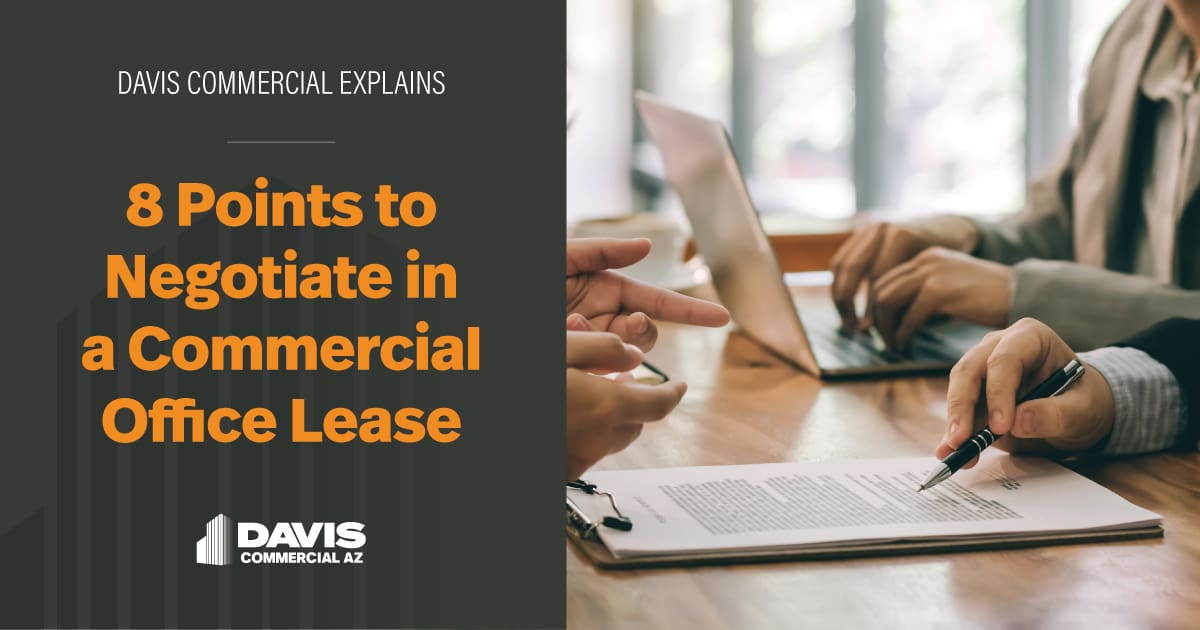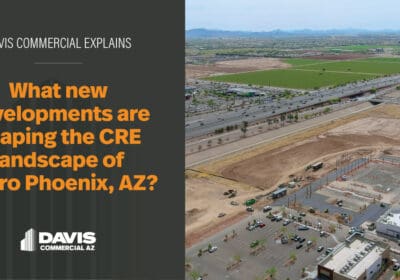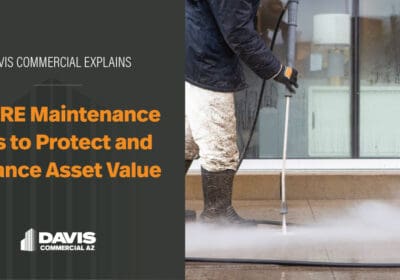8 Points to Negotiate in a Commercial Office Lease

There is a quote by American businessman and former FBI hostage negotiator, Christopher Voss, which perfectly sums up negotiation. He says, “Successful negotiation is not about getting to ‘yes’; it’s about mastering ‘no’ and understanding what the path to an agreement is.” When entering into an agreement in commercial real estate it’s imperative to do your homework before taking the lease agreement to your attorney for review.
There are many factors at play that can impact lease negotiations, and they can vary based on the market sector and location. Being specific about non-negotiables and making a list of what matters to the business, how it affects employees, and ultimately the bottom-line is key. Whether it is a tenant or a landlord’s market conditions are also a key factor when determining an effective negotiation strategy. Learn more about developing the right strategy for leasing in a landlord’s or tenant’s market in Andrea Davis’ first book, SimpLEASEity, available on Amazon. The audio version is free.
At Davis Commercial AZ we know that negotiating a commercial office lease is a complex process. Check out the 8 points to negotiate a commercial office tenant-friendly lease recommended by our team of experts:
- Lease term: The duration of the lease is an important consideration. This can have a significant impact on the rent and other terms of the lease. Longer lease terms may result in lower rent rates but can also limit flexibility and increase risk. A shorter lease may
- Rent: The rent amount and how it is calculated is a critical component of the negotiation process. A longer-term lease often allows for more rent abatement. Annual rent increases can be a fixed percentage or tied to inflation, known as CPI (consumer price index). Remember, the landlord is not your partner in business, they own and manage the property, so the economics of the deal are important. The goal is to find a middle ground both parties can thrive on.
- Security deposit: Security deposit amounts are seldom negotiable. It is not unreasonable to negotiate for a lower security deposit or work with the landlord and ask that it is phased in over time, especially if there’s a longer lease period than average.
- Maintenance and repairs: Who is responsible for maintenance and repairs is determined by the type of lease the landlord requires. Read your lease carefully to understand what you as the tenant are responsible for financially. Your attorney and tenant rep broker can help with this. These areas may include repair work that is beyond control, a roof leak and/or parking lot maintenance over time. The terms regarding maintenance and repairs should be explicit. The lease template is seldom negotiable. The three main types of leases are:
- Full-service lease (FSG) where all other costs are included in the lease,
- A triple net lease (NNN) where the tenant pays base rent and is responsible for all other expenses such as common area maintenance (CAM), property taxes, utilities and insurance, etc.
- A modified gross lease (MG) where the tenant pays for their utilities and janitorial.
- Subleasing and assignment: Negotiating the terms of subleasing and assignment is important for protecting the business’ future interests. If you grow, it is helpful to understand in advance the cost of exiting your lease. Subletting is one way to do this.
- Termination and renewal options: Including termination and renewal options in the lease can provide flexibility and protection for the business. Negotiate for clear terms regarding when and how the lease can be terminated, if at all, and whether there’s the option to renew.
- Tenant improvements: It’s smart to negotiate that tenant improvements are included in the lease. This gives the tenant an opportunity to customize the space to fit their needs. Again, what improvements will be made to the space and who is financially responsible for the work should be made clear in the terms. Make sure the landlord-tenant improvement responsibilities are written in your lease.
- Future improvements and alterations: This is a key area of negotiation in your lease regardless of the lease type. If making improvements and alterations to the space are necessary, negotiating the terms for this type and level of work upfront prior to lease signing is crucial. It should be decided who is responsible for the improvements, who manages the work, and how these alterations are handled at the end of the lease.
Remember, every component of the lease is negotiable.
Consideration of these negotiation points alongside working with experienced tenant reps helps ensure a fair and favorable commercial office lease. Most landlords want to build a lasting relationship with tenants, so they are no strangers to negotiation. Seeking out a trusted partner to guide the process is best practice. At Davis Commercial AZ, we have more than 20 years’ experience advising clients who are looking to lease, sell or buy. To learn more about our process and work together, contact us here.




